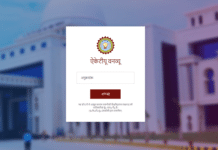Freshers in a setback with CBCS? All that you need to know about it.
(Choice based Credit System)
1. What ‘Choice’ are you talking about?
A student has to study compulsory core courses. He has the freedom to choose one subject from the pool of elective courses. As a B.Com (H) student, you may study Micro Economics or Insurance & Risk Management as per your interest. Besides you get to learn AEC (Ability Enhancement Courses) such as Environmental Sciences.
2. What are the ‘Credits’ here?
Credits build upto grades. You get credits for every subject you take up. It is a way of accounting for the academic accomplishments of a student in a semester based academic year.
3. Okay, how is it going to benefit you?
a) Every student would study a standard syllabi, with similar examination structure and grading.
b) It would allow a PAN – India mobility. Also, this system is prevalent in most of the top institutes and foreign universities. Likewise, it would be a great help in case of migration.
c) The students would be easily accepted owing to the same means used for awarding grades.
4. Why is everyone against it? What problem does it pose?
The whole course structure would be guided by UGC. It would require similar pattern of examinations to enable mobility among universities. According to the teachers, it would prove as a hindrance in their democratic representation. “It could amount to unprecedented bureaucratic interference by the government”.
“The CBCS is a part of the larger package of education reforms that aims at consciously destroying public universities to make way for private and foreign universities”…alleged NanditaNarain, President of DUTA.
The shortcomings include lack of infrastructure. 38% to 40% of the teachers in state and central universities are adhoc, they have very little say in the decisions of the university, with DU possessing over 4,000 such teachers.
“Instead of standardizing and controlling the flow and content of knowledge down to what will be taught at classroom level, the policy makers could standardize and create global standards of infrastructure, that would be a welcome step.” Suggests Prof. SatishDeshpande, Delhi University. It would lead to reduction in quality, as the better colleges would have to lower their standards.
5. Did you know about this before getting into DU?
Most of the students did not even have a vague idea of what it was all about. There was no mention of it in the information bulletins or FAQs. In the nutshell, public at large is not so happy with the hasty implementation of this system.




















